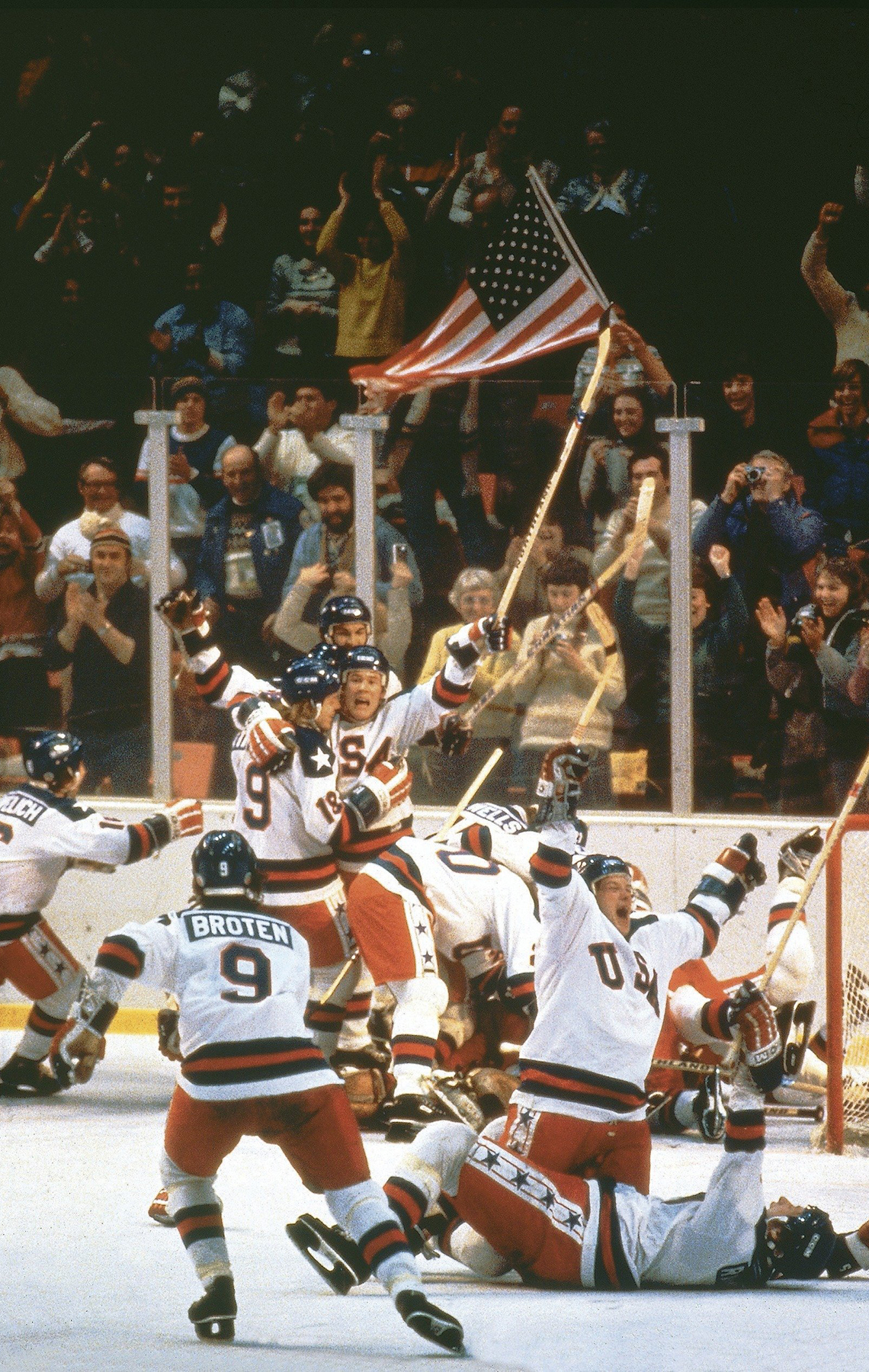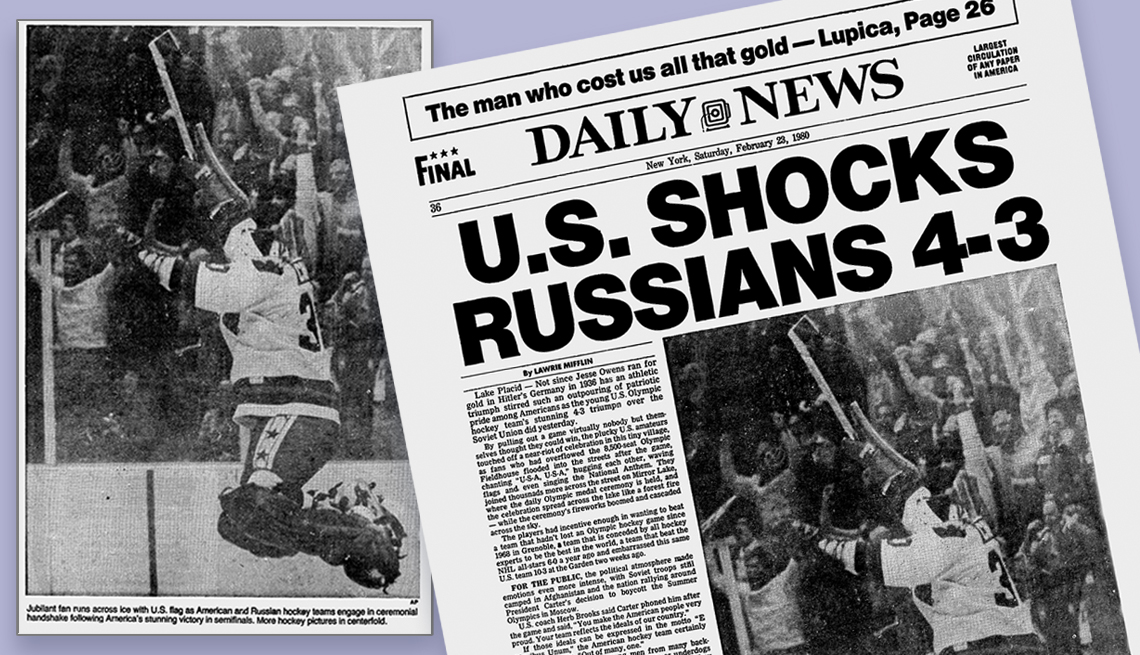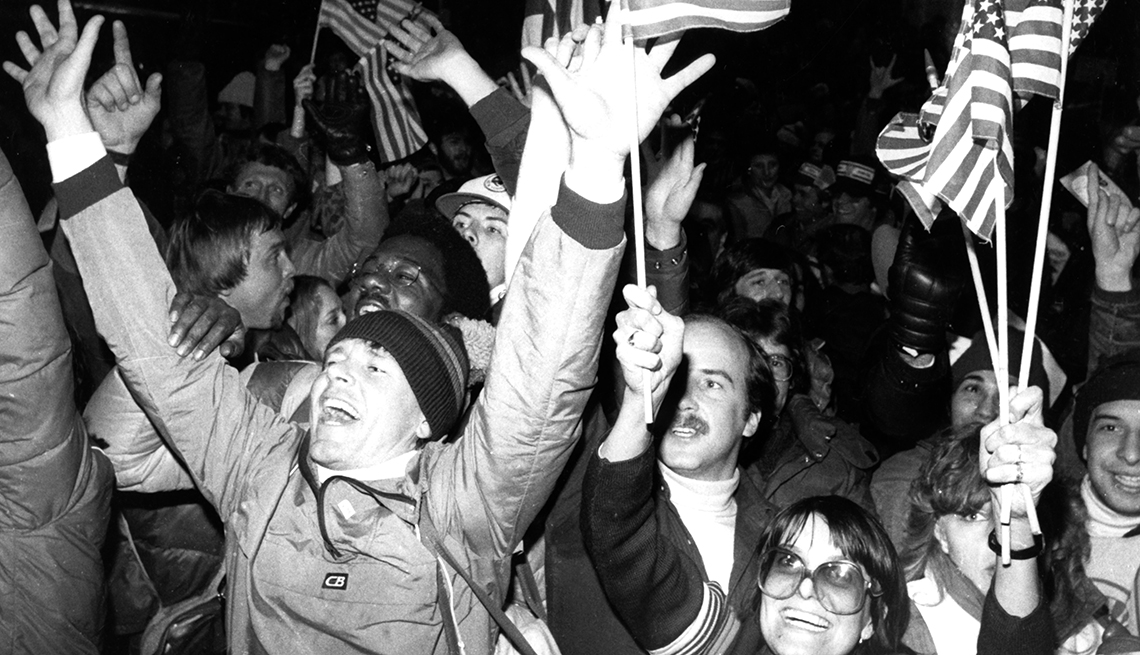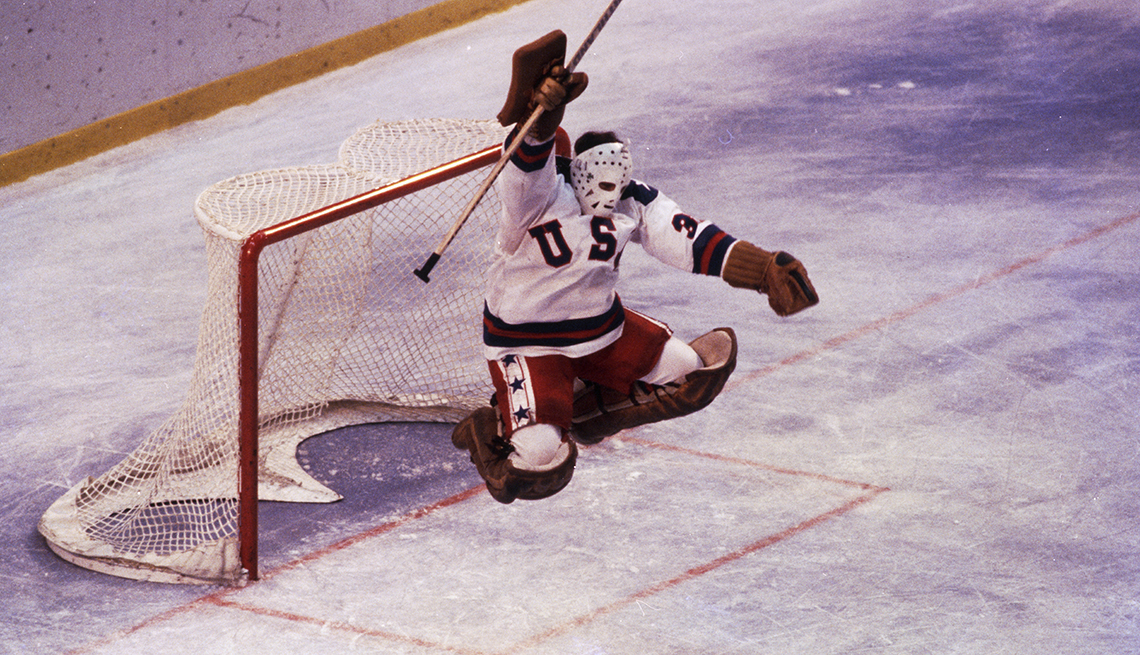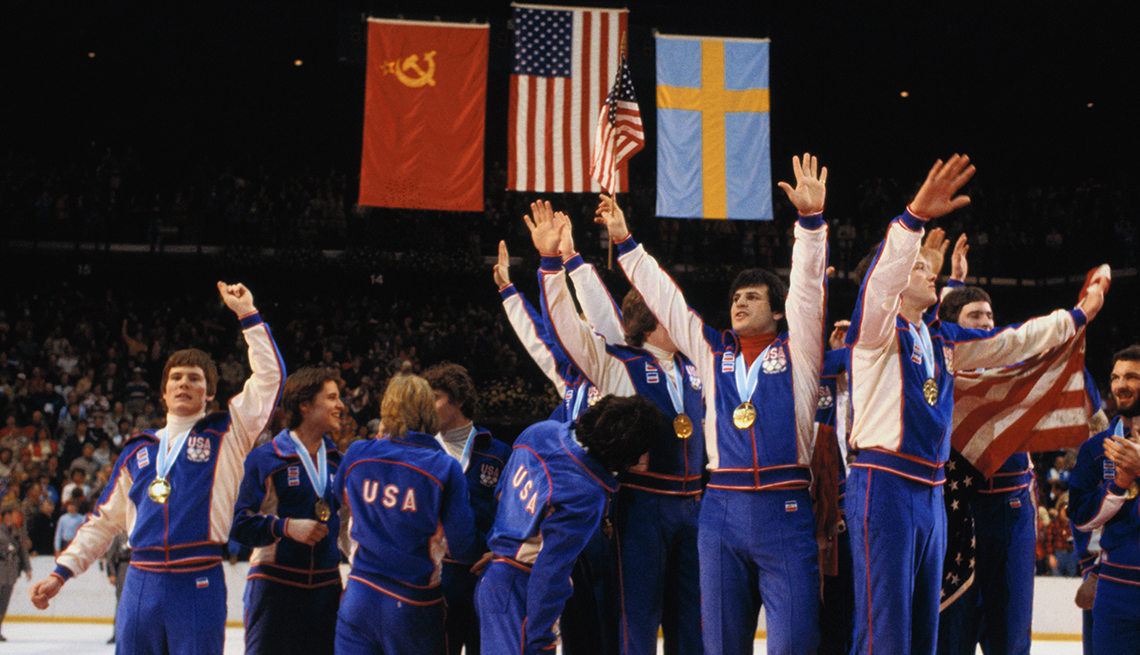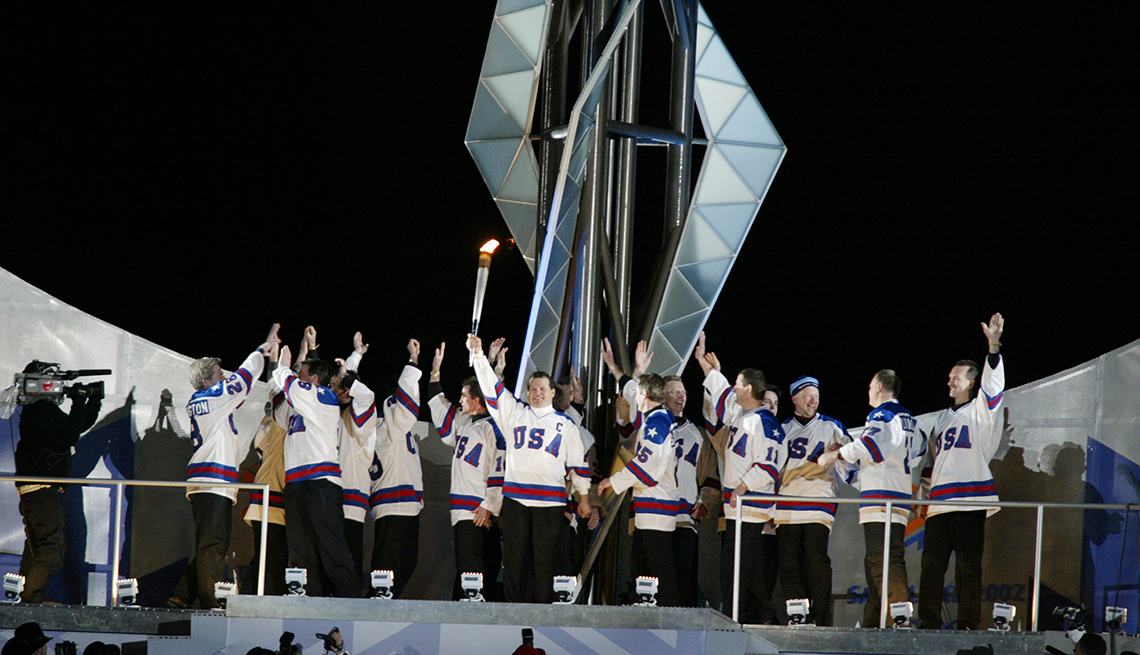Celebrating the U.S. Hockey Team's 'Miracle on Ice'
Relive the historic upset of the Soviet Union in the 1980 Winter Olympics
On July 15, 1979, Americans switched on their TVs to watch President Jimmy Carter deliver what would become known as his “crisis of confidence” speech. America, the president told millions, had lost its sense of greatness. “The erosion of our confidence in the future is threatening to destroy the social and the political fabric of America,” Carter said. “The symptoms of this crisis of the American spirit are all around us."
First Vietnam, then Watergate and now long lines at the gas pump, as inflation soared. “What can we do?” Carter asked.
Less than two weeks later, in Colorado Springs, Colorado, some 70 college hockey players — nearly all from Minnesota or Massachusetts — moved into dormitories at the U.S. Olympic Training Center, where coach Herb Brooks, 42, began the process of winnowing the group to the 20 players who would represent America at the 1980 Winter Olympics in Lake Placid, New York. Brooks’ team at the University of Minnesota had just won the NCAA Division I national championship, and a bunch of his players were now on the ice.
"They were the greatest hockey team the Russians ever produced."
The tryouts went unnoticed, for there was little hope of success. The Soviet Union had won hockey gold in 1964, 1968, 1972 and 1976, and just five months earlier had defeated the NHL All-Stars — the best of North America's professional hockey players — in an exhibition game 6-0. The Soviets had not lost an Olympic game since 1968.
Still, among college hockey players, the pressure to make the U.S. team was extreme, and the rivalries were intense.
Mike Eruzione (forward, Boston University): I knew there were lots of good players in Minnesota but didn't realize the history and intensity. You don't know the coach, he doesn't know you, so you wonder. But I felt I had a good chance to make the team.
Gerald Eskenazi (sportswriter, New York Times): I was a hockey guy. Originally, the newspaper was not going to cover the team. They didn't think the USA was going to do anything special. But I convinced the Times to send me. Coach Brooks pulled the team together in a matter of weeks. He was pretty tough on them. He sort of pitted the New England guys against the Minnesota guys.
Herb Brooks (coach, quoted on Aug. 9, 1979): The system ... will be different than past Olympic teams. We want to learn the European style of hockey so we can compete with them. We're going to take a page from Europe's book. We're going to be more innovative, more mobile, and we're going to break ... stereotypes in our system of play.
John Powers (sportswriter, Boston Globe): They used to pick a team and send them to the Olympics. And usually they got crushed. But Herb got this team together in September, and they played through to the Olympic Games in February — 61 exhibition games. They played some NHL teams, some college teams, and they played minor league teams in Canada, a real sock-'em league. Herb wanted to make sure his team could deal with the international game, which was played physically.
Player Eruzione: We had practice one day, and when it ended, Herb said, “OK, we're on the ice tomorrow at 10 o'clock. Mike, you're the captain. See you tomorrow.” It was nice, but to be honest with you, it wasn't a big deal. This was a team of captains. Almost every guy on the team was the captain of his college or high school team.
Sportswriter Powers: The last exhibition game was on Feb. 9, right before the Olympics, against the Soviets at Madison Square Garden. The Soviets crushed the U.S., who were all amateurs. The Soviets were all hockey legends. Many of them were going to go into the hockey Hall of Fame.
Jim Craig (goalie, Boston University): They were the greatest hockey team the Russians ever produced.
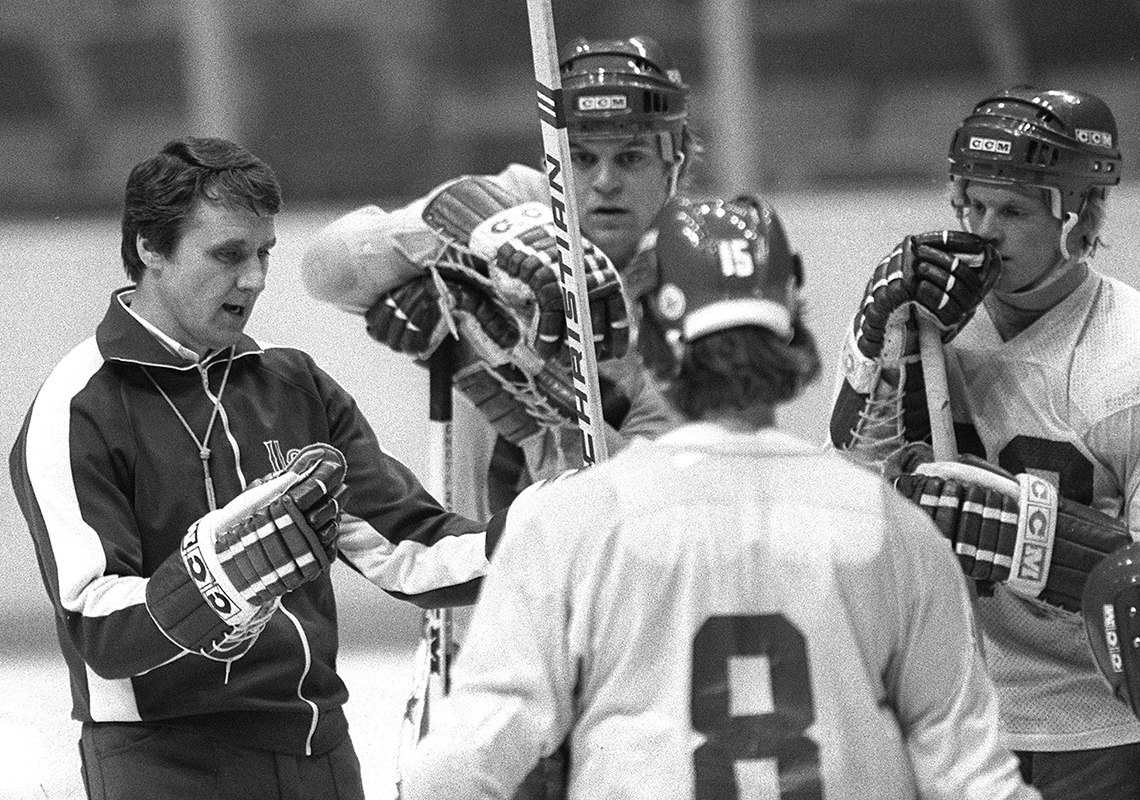
AP Photo/Douglas Ball
Team USA coach Herb Brooks, left, speaks to members of the team during a break in practice.
Meanwhile, off the ice, the crisis of confidence had deepened. In November, Iran had seized more than 50 hostages at the U.S. embassy in Tehran. In December, the USSR had invaded Afghanistan, and Americans became fearful of the Soviets’ growing nuclear threat.
Vice President Walter Mondale, of Minnesota: It was a very intense time. We thought the Soviets were going to do us harm. They were strutting around, threatening us with their nuclear weapons. I'd been involved with the Olympics for some time, so my wife, Joan, and I went up there. We didn't know we were going to see the greatest hockey game of all time.
The world arrives in Lake Placid, New York
The paint was still drying on many of the athletic complexes in Lake Placid when 1,400 athletes from 36 countries converged on the tiny alpine village with its Main Street and single stoplight. The best known of the Americans were speed skater Eric Heiden and skiing brothers Steve and Phil Mahre. Few sports fans had heard of Mike Eruzione, Jim Craig or coach Herb Brooks. Few knew of the deep-seated obsession Brooks possessed to defeat the Soviets — or that he himself had been the last player cut from the 1960 Olympic team, the last U.S. hockey team to beat the USSR and win gold. Only one of the American players in 1980 had any Olympic experience. Their average age was 22, compared with 27 on the Soviet side.
A.J. Baime (schoolkid sports fan then, now an author and journalist): I was only 9, but I was a hockey fan, and I knew enough to know that the Red Army, as the Soviet team was called, had come to symbolize Soviet dominance around the globe.
Soviet propaganda song at the time (translated): The ears ring with music of attack! The Ice Brotherhood fights hard. And we trust in the courage of desperate guys. Real men play hockey! Cowards don't play hockey! Cowards don't play hockey!
Vsevolod Kukushkin (Soviet journalist and translator, who traveled with the Soviet team): The team was staying at the Olympic Village with other athletes. It was a quite tense situation. In the USA some people were crazy enough to think that [Soviet] ice hockey players were responsible for this adventure in Afghanistan. That is stupid.
Sportswriter Powers: They had built a minimum-security prison right outside of town, and that's where the Russian players were living. The Americans were in trailers. There were only a handful of hotels/motels in town. There was no place to put everybody.
Steve Yianoukos, Lake Placid Zamboni driver (later an athletic director at Clarkson University): Russian players were not allowed to come to the NHL, but there were rumors that players might be defecting after or during the Olympics. It was real high security.
Sportswriter Powers: The first game, against Sweden, was played the day before the opening ceremonies. The Americans hadn't beaten the Swedes since the 1960 Olympics. The Swedes were seeded third; the Americans, seventh. The U.S. never led in that game. They were behind, 1-0. They were behind, 2-1. Near the end of the game, Herb pulled [goalie Jim] Craig to get an extra guy, and Billy Baker scored with 27 seconds left, to tie it.
Dave Christian (defenseman, University of North Dakota): It was a late goal, maybe the biggest of the whole tournament. How the tournament would have gone with an opening loss, who knows? Billy Baker did score. Everything started to snowball from that point on.
Kelly Brooks Paradise (coach Brooks’ daughter): Lake Placid was gorgeous, but the town was just crazy and you couldn't get any cars anywhere. My mom, my brother and I were staying in a cottage up in the mountains, and we almost missed the opening ceremonies. They couldn't get a car up to get us. My mom was hitchhiking, and some local in a pickup truck was able to get us down to the opening ceremony.
Player Christian: The fact that we were in the Olympics hit home when we marched in the opening ceremonies. It was, like, “This is the Olympics. Here we are!” Czechoslovakia was the next game. Everybody looked at the Czechs as being the only team that had a shot at beating the Soviet Union.
Sportswriter Eskenazi: That was the first time you heard the chant, “U-S-A! U-S-A!"
Player Eruzione: As a country, we were looking for something to feel good about. Herb sometimes used to call us a lunch-pail, hard-hat group of guys, because that's who we were. We were working-class kids who came from working-class families, and I think America saw that and took great pride in that.
The semifinal showdown with the Soviet Union
"If the Soviet Union were to play this American team 100 times, the Soviets would win 99 of them. This was the one."
After their unexpected win in the second game, the Americans had seized the international spotlight. When the U.S. played Norway, the opponent scored first but the Americans rallied to win 5-1. The next victim was Romania, 7-2 (the only game in the Olympics in which the U.S. team was not losing at some point). Then, a 4-2 victory over West Germany set up a semifinal — against the Soviets. All the while the Soviet team was crushing opponents — beating Japan 16-0, and the Netherlands 17-4. Could the U.S. compete?
Player Christian: We were getting encouraging telegrams from all over the United States, and we put them up on the walls of the locker room and on the way out to the ice. We knew people were paying attention.
Buzz Schneider (forward, University of Minnesota, quoted on Feb. 22, 1980): There's a feeling, like magic. It's almost as if we're a team of destiny. But you can't say that. Things can turn on you so quick.
Erik Wemple (schoolkid hockey fan then, now a media reporter, Washington Post): My mother called me at school on the public phone there and asked me if I would like to go. I said, “Of course.” The ticket didn't say USA versus Russia. It just said medal round or something like that. The arena on the main street of Lake Placid was an intimate structure. The chants of “U-S-A!” — it was unbelievable, overwhelming, cacophonous, glorious.
Zamboni driver Yianoukos: I came out and did the ice right up to the minute the game started. The whole crowd was standing, chanting “U-S-A!” You could actually feel the building vibrate. I've been to five World Series games. I've been to the Stanley Cup finals. I've been to the Final Four in basketball. I've never experienced intensity like that.
Coach Brooks (in his locker-room speech to the team): You are born to be a player. You are meant to be here at this moment. You are meant to be here at this game. Let's have the poise and possession with the puck.
John Harrington (forward, University of Minnesota Duluth): There were butterflies. You can't avoid that in a big game at any level of any sport. But there's also that little smiling face — this is exactly what I play the game for.
Player Craig: The plan was to attack them at their own game, which was speed. For most teams, the Russians were so fast and so well conditioned that, after the first 10 minutes, they knew they couldn't skate with them, so they would try to defend instead of attack. Herb Brooks’ whole strategy was that we'll be the best-conditioned athletes. We didn't defend. We were going to attack the whole game.
Vice President Mondale: I was halfway up in the crowd. Joan and I were cheering like the devil. They [the Soviets] were professionals. I mean, our guys were just college kids. And one of the joys of the thing was that the coach was from Minnesota, and I think most of the players were, too. So for me, it was like a hometown team.
Al Michaels (at the game, reporting for ABC, as the referee stood ready to drop the puck): What we have at hand — the rarest of sporting events. An event that needs no buildup, no superfluous adjectives. In a political or nationalistic sense, I'm sure this game is being viewed with varying perspectives. But manifestly, it is a hockey game. The United States and the Soviet Union on a sheet of ice in Lake Placid, New York. ... [The puck drops.] Here we go, as the game is underway!
Michele Tafoya (then 15, now an NFL sportscaster): I was watching the game on television [there was a tape delay, so the game was not seen on TV live], lying on my family room floor, with my brother and sister and parents, in California. None of the players on either side were evil. But symbolically, it was kind of good versus evil.
Player Eruzione: When you sat on the bench, you could hear the crowd — “U-S-A! U-S-A!” — but when you got on the ice, it was like you were in a cave. You heard nothing. You only heard your teammates calling for a pass or the whistling for a line change.
Journalist Wemple: The colors were unbelievable. The Soviets came in with their red uniforms. Those uniforms were amazing. And then the USA in red, white and blue. Visually, it was the most rich thing that you could imagine.
Author Baime: That first period? You couldn't make that stuff up! The Soviets scored first. Then Buzz Schneider scored for the USA. The Soviets came back minutes later with a second goal, and as the time was running out in the first period, something unreal happened.
Mark Johnson (forward, University of Wisconsin): Davie [Christian] had the puck, and it looked like he was going to take a shot. I'm thinking, If there's a rebound, I'm going after it. Tretiak [the Soviet goalie] left a rebound, which most times he didn't do. I got the puck and put it in with one second left. Then the horn went off to end the period.
Journalist Wemple: When the U.S. scored, the time between the puck landing in the net and the entire arena exploding was milliseconds.
Player Johnson: We go into the locker room, tied 2-2. Instead of having to beat them for three periods, now there's only two.
Al Michaels (looking back): In the second period and the first part of the third, the Soviets were dominating [taking the lead 3-2]. Jim Craig was making saves by standing on his head.
Author Baime: With 12 minutes left, Mark Johnson tied the game again. Brooks was pacing behind the bench like he was possessed. There were 10 minutes left, and it was Team USA 3, Soviets 3.
Player Eruzione: John Harrington got to the puck and threw it up the board to Mark Pavelich, and Pav found me. I picked up the puck and came in on the goaltender. There was a defenseman in front of me, and I thought, If he stays, I'm going to use him as a screen [so the goalie can't see the puck]. He did, and as soon as the puck left my stick, I thought it was in.
Al Michaels (at the game, reporting for ABC): Eruzione scores! Mike Eruzione! Now we've got bedlam!
Player Eruzione: We've got the lead, and there are 10 minutes left to go in the game. It was the longest 10 minutes of our lives. I hadn't seen the game in probably 40 years, but I watched it six months ago. I couldn't believe how good we played in that last 10 minutes.
Al Michaels (reporting from the game): "28 seconds ... the crowd going insane ... Kharlamov shooting into the American end again ... McClanahan is there ... the puck is still loose ... 11 seconds! You've got 10 seconds! Countdown going on right now! ... Morrow up to Silk ... Five seconds left in the game! ... DO YOU BELIEVE IN MIRACLES? YES!
Journalist Wemple: It was just unbelievable.
Sportswriter Powers: I remember the Soviets were standing in the middle of the ice, waiting to shake hands, with their chins on their sticks, just watching. And the Americans were celebrating on the other end.
Translator Kukushkin: If the Soviet Union were to play this American team 100 times, the Soviets would win 99 of them. This was the one.
Vice President Mondale: We went down to the locker room to meet the team, and President Carter called in. He was excited.
President Carter to Herb Brooks: We were trying to do business, and nobody could do it. We were watching the TV with one eye and Iran and the economy with the other.
Brooks to President Carter: This is a great win for the American people. It proves our way of life is the right way.
One more for the gold
Many fans forget that the Americans still had an Olympic final to play, against Finland. On Feb. 24, 1980, the U.S. sealed the gold with a 4-2 win. Iconic moments stick out: goalie Jim Craig looking for his dad in the stands, Craig wearing the American flag over his shoulders, and the whole team crowding onto the podium at the medal ceremony. And over the next 40 years, the Miracle on Ice became the stuff of legend. So what, after four decades, is the legacy?
Sportswriter Powers: The only regret was that it ended so fast. They beat the Russians. Two days later, they beat the Finns. Then — bam! — the games are over. They realized they were never going to play together as a team again. Some guys went straight to the NHL. Some went back to school. The only guy who never played another game was Eruzione. He figured, probably correctly, that the Rangers or Hartford would have signed him, let him sell tickets for a couple of weeks, then sent him down to the minors. He'd already spent time getting banged around down there and didn't relish more. “I don't want to be remembered as a struggling hockey player,” Eruzione said. “I'm going out on top."
Dan Brooks (coach Herb Brooks’ son): People say to me all the time, “I remember exactly where I was when I saw the Miracle on Ice.” Usually when people say something like that, they're talking about a tragedy. “I remember where I was on September 11.” “I remember where I was when I heard the space shuttle had exploded.” But this is a positive moment — not just in sports history but American history.
Sportscaster Tafoya: I think America really needed it. This wasn't beating Sweden or Canada. This was much bigger in the scope of the world. It was a great unifying moment of national pride and patriotism. I'm hoping we can have a moment like that again soon.
A.J. Baime is the author of the books Go Like Hell and The Accidental President.
- |
- Photos

